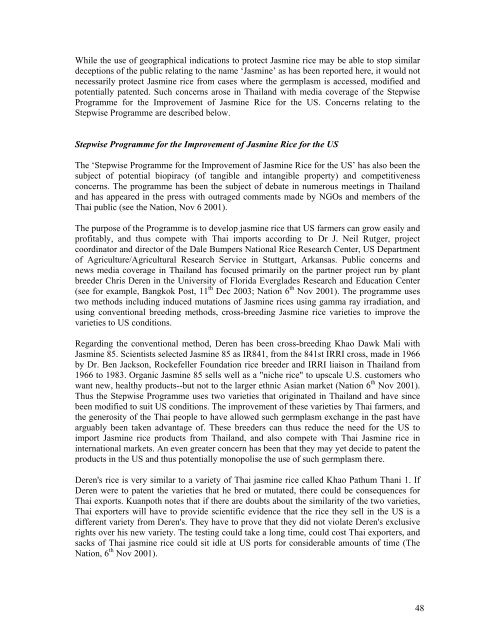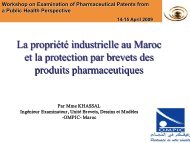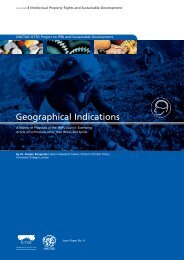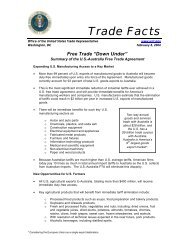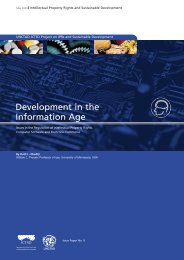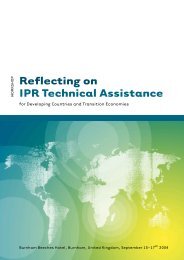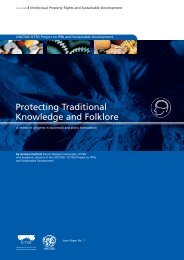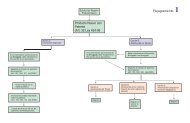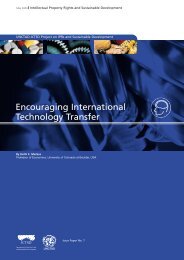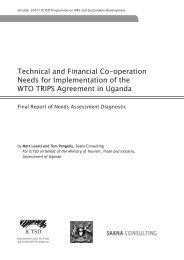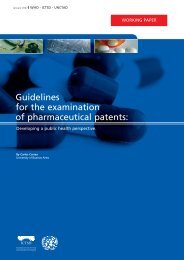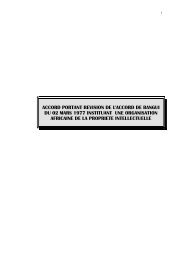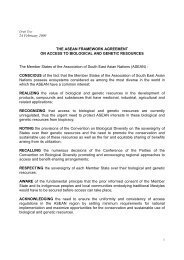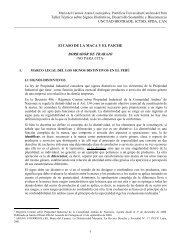Governance and Micropolitics of Traditional ... - IPRsonline.org
Governance and Micropolitics of Traditional ... - IPRsonline.org
Governance and Micropolitics of Traditional ... - IPRsonline.org
Create successful ePaper yourself
Turn your PDF publications into a flip-book with our unique Google optimized e-Paper software.
While the use <strong>of</strong> geographical indications to protect Jasmine rice may be able to stop similar<br />
deceptions <strong>of</strong> the public relating to the name ‘Jasmine’ as has been reported here, it would not<br />
necessarily protect Jasmine rice from cases where the germplasm is accessed, modified <strong>and</strong><br />
potentially patented. Such concerns arose in Thail<strong>and</strong> with media coverage <strong>of</strong> the Stepwise<br />
Programme for the Improvement <strong>of</strong> Jasmine Rice for the US. Concerns relating to the<br />
Stepwise Programme are described below.<br />
Stepwise Programme for the Improvement <strong>of</strong> Jasmine Rice for the US<br />
The ‘Stepwise Programme for the Improvement <strong>of</strong> Jasmine Rice for the US’ has also been the<br />
subject <strong>of</strong> potential biopiracy (<strong>of</strong> tangible <strong>and</strong> intangible property) <strong>and</strong> competitiveness<br />
concerns. The programme has been the subject <strong>of</strong> debate in numerous meetings in Thail<strong>and</strong><br />
<strong>and</strong> has appeared in the press with outraged comments made by NGOs <strong>and</strong> members <strong>of</strong> the<br />
Thai public (see the Nation, Nov 6 2001).<br />
The purpose <strong>of</strong> the Programme is to develop jasmine rice that US farmers can grow easily <strong>and</strong><br />
pr<strong>of</strong>itably, <strong>and</strong> thus compete with Thai imports according to Dr J. Neil Rutger, project<br />
coordinator <strong>and</strong> director <strong>of</strong> the Dale Bumpers National Rice Research Center, US Department<br />
<strong>of</strong> Agriculture/Agricultural Research Service in Stuttgart, Arkansas. Public concerns <strong>and</strong><br />
news media coverage in Thail<strong>and</strong> has focused primarily on the partner project run by plant<br />
breeder Chris Deren in the University <strong>of</strong> Florida Everglades Research <strong>and</strong> Education Center<br />
(see for example, Bangkok Post, 11 th Dec 2003; Nation 6 th Nov 2001). The programme uses<br />
two methods including induced mutations <strong>of</strong> Jasmine rices using gamma ray irradiation, <strong>and</strong><br />
using conventional breeding methods, cross-breeding Jasmine rice varieties to improve the<br />
varieties to US conditions.<br />
Regarding the conventional method, Deren has been cross-breeding Khao Dawk Mali with<br />
Jasmine 85. Scientists selected Jasmine 85 as IR841, from the 841st IRRI cross, made in 1966<br />
by Dr. Ben Jackson, Rockefeller Foundation rice breeder <strong>and</strong> IRRI liaison in Thail<strong>and</strong> from<br />
1966 to 1983. Organic Jasmine 85 sells well as a "niche rice" to upscale U.S. customers who<br />
want new, healthy products--but not to the larger ethnic Asian market (Nation 6 th Nov 2001).<br />
Thus the Stepwise Programme uses two varieties that originated in Thail<strong>and</strong> <strong>and</strong> have since<br />
been modified to suit US conditions. The improvement <strong>of</strong> these varieties by Thai farmers, <strong>and</strong><br />
the generosity <strong>of</strong> the Thai people to have allowed such germplasm exchange in the past have<br />
arguably been taken advantage <strong>of</strong>. These breeders can thus reduce the need for the US to<br />
import Jasmine rice products from Thail<strong>and</strong>, <strong>and</strong> also compete with Thai Jasmine rice in<br />
international markets. An even greater concern has been that they may yet decide to patent the<br />
products in the US <strong>and</strong> thus potentially monopolise the use <strong>of</strong> such germplasm there.<br />
Deren's rice is very similar to a variety <strong>of</strong> Thai jasmine rice called Khao Pathum Thani 1. If<br />
Deren were to patent the varieties that he bred or mutated, there could be consequences for<br />
Thai exports. Kuanpoth notes that if there are doubts about the similarity <strong>of</strong> the two varieties,<br />
Thai exporters will have to provide scientific evidence that the rice they sell in the US is a<br />
different variety from Deren's. They have to prove that they did not violate Deren's exclusive<br />
rights over his new variety. The testing could take a long time, could cost Thai exporters, <strong>and</strong><br />
sacks <strong>of</strong> Thai jasmine rice could sit idle at US ports for considerable amounts <strong>of</strong> time (The<br />
Nation, 6 th Nov 2001).<br />
48


